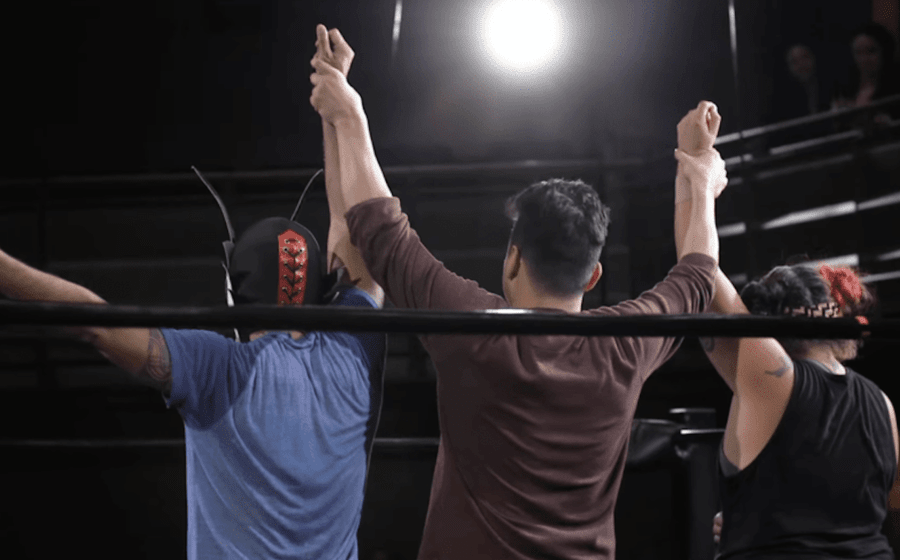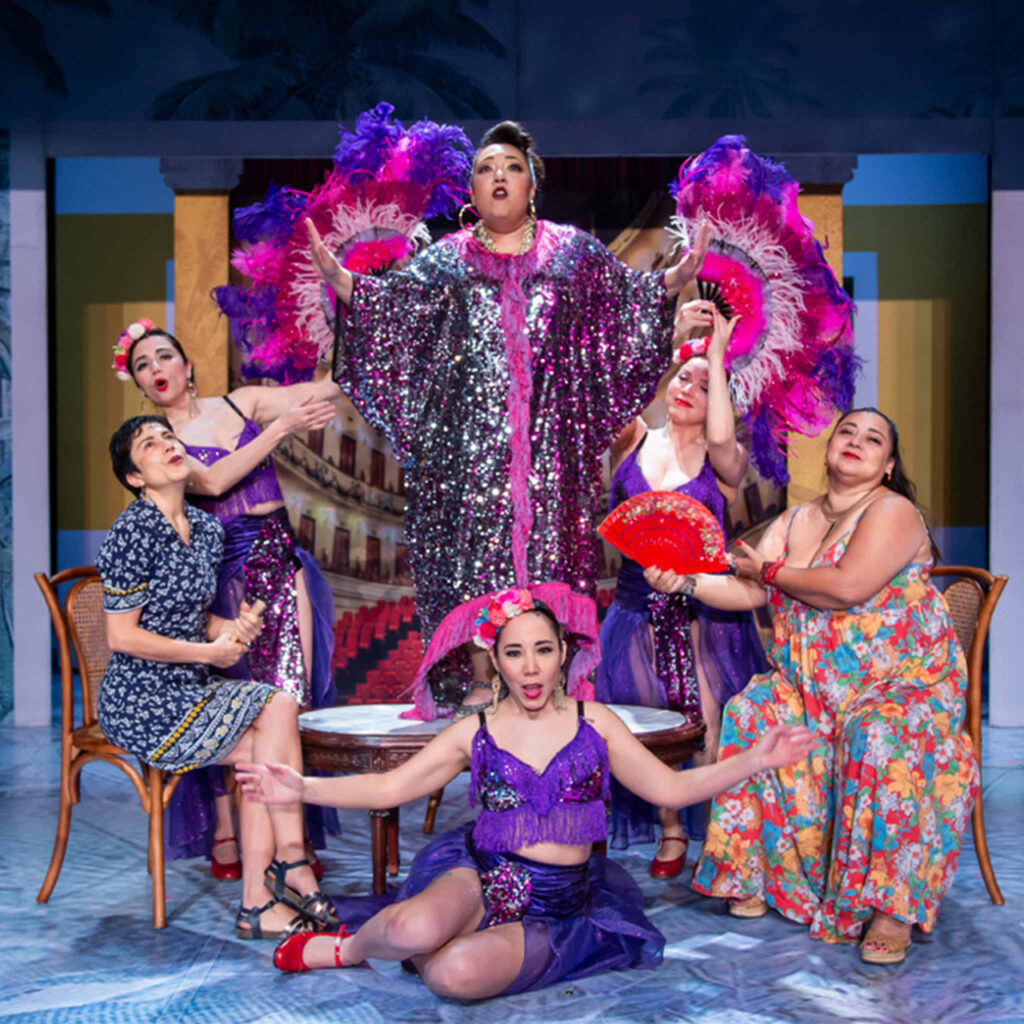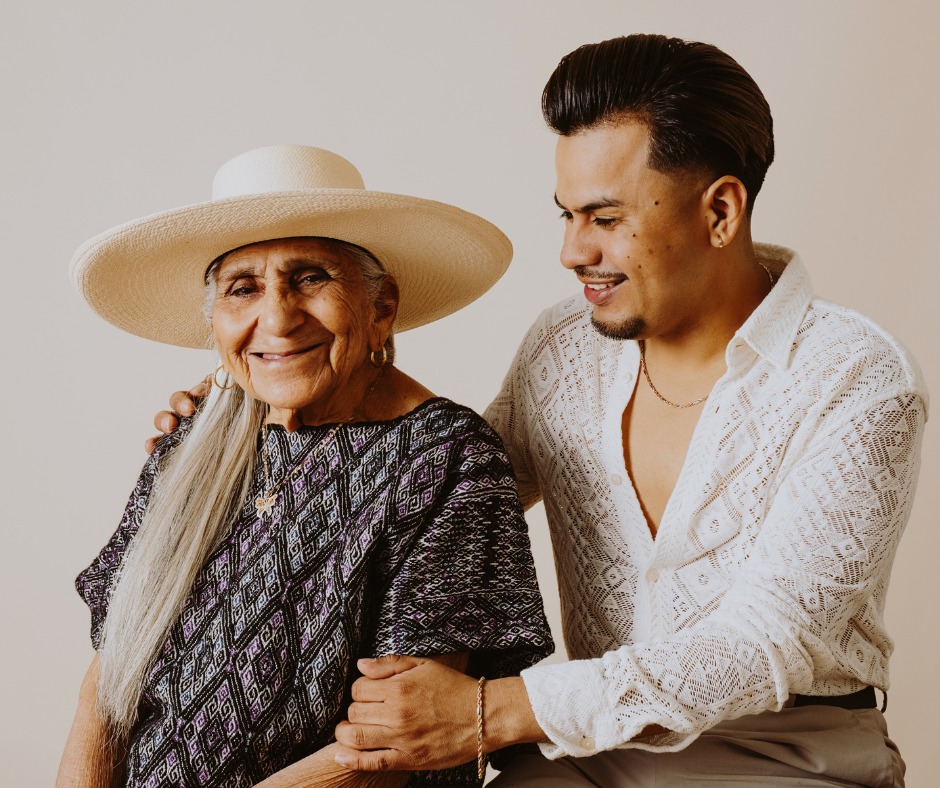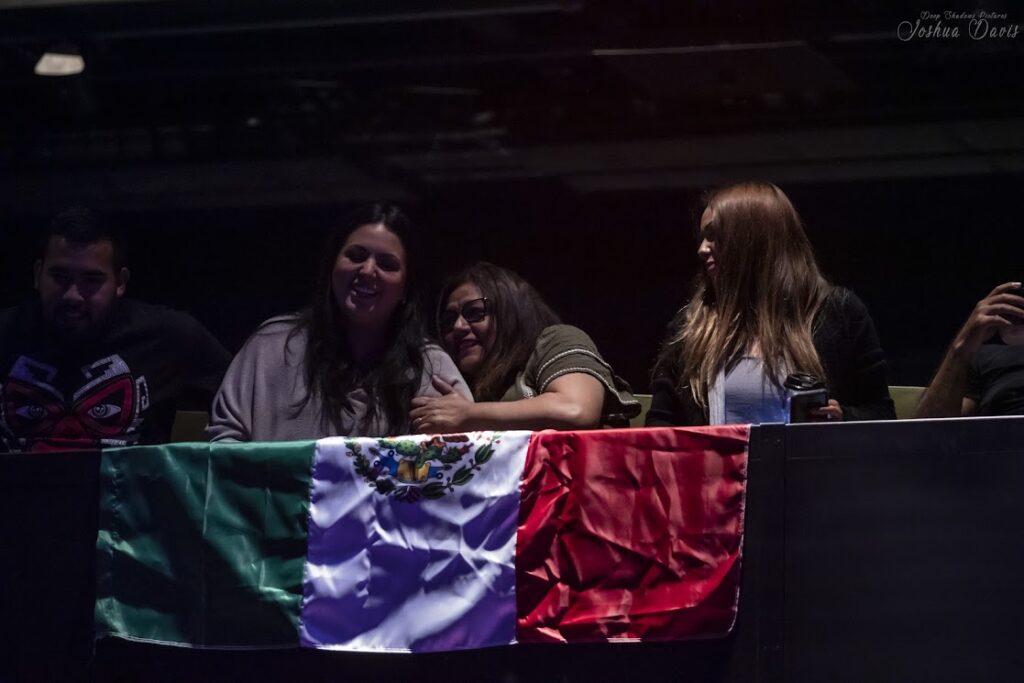It is no secret that Chicago is home to legendary godparents of Latiné theatre, folks with artistry as magnificent as their warm personalities. In chronicling Destinos, Chicago Latino Theater Alliance’s annual, international festival, several names come up who have fought for space: director Henry Godinez, writer Tanya Saracho, National Museum of Mexican Art founder Carlos Tortolero, and, chief among them, CLATA co-founder and executive director Myrna Salazar, who passed last summer. The impact of such trailblazers cannot be overstated, as we see the stories and storytellers they’ve uplifted spread as far and wide as good chisme.
After participating in the 2017 Destinos festival, for instance, Water People Theater’s La Peor de Todas went on to Mexico City for a 2019 production at Universidad del Claustro de Sor Juana, and Aguijón Theater’s 2022 Cintas de Seda will form part of this year’s International Theater Festival in Santiago de Los Caballeros in the Dominican Republic. This year, Destinos—which kicked off yesterday and runs through Nov. 12—provides a highly anticipated festival through which Chicago’s Latiné lineage of artists continue to push the boundaries of American theatre.

Current CLATA executive director Jorge Valdivia shares there’s “un poquito de todo,” in the Destinos festival—a bit of everything for everyone. He’s traveled from Chicago to various Latin American countries to curate art for each festival. But he is quick to credit “the hard work of Myrna Salazar, who had the vision to bring to her team,” for the festival’s birth and endurance. Over a fateful lunch meeting years ago, Tortolero and Salazar first hatched the dream of a Latiné theatre collective partnering with organizations around the city to produce a festival with local and international works side by side.
Over the years, Salazar would dream of opening a permanent home in the city, and CLATA carries her determination pa’lante. Named by Salazar for the dual meaning of “destiny” and “destination,” Destinos is celebrating its sixth birthday this year. And Salazar’s spirit still infuses the festival. As she told the Sun-Times in 2021, “These are our stories, our own narratives and our own experiences. They aren’t influenced by a white director who says you have to look a certain way or have an accent when you speak English. We want things that show the value of what it is to be Latino, whether it’s through our history or the flavors we bring to the country. And to put that onstage, it’s very important.”
Cracking open theatregoing tradition in immersive, rowdy glory as part of this year’s festival is Christopher Llewyn Ramirez and Jeff Colangelo’s LUCHA TEOTL, running through Oct. 29 at the Goodman. When it first premiered with Dallas’s Prism Movement Theater, the crowd was so packed that, Colangelo recalls, “It was like being in the middle of an earthquake. People would stomp their feet and bang on the side of the bars. It was an overwhelming feeling of energy, passion, and excitement for what they were seeing.”

Pairing reverence for Aztec gods with today’s lucha libre culture, LUCHA TEOTL walks along past and future. Ramirez and Colangelo self-consciously look ahead to inheritors of American theatre and the luchador world, while honoring roots. From its development in 2021 they intended to bring the show to Chicago, a known hub for pro wrestling. When in town for his 2021 Destinos debut in American Mariachi, Ramirez scoped out venues and, on entering the Goodman’s Owen Theatre, immediately envisioned its immersive capacity and wrestling ring possibilities. He alerted his co-creator: “This is it.”
Watching the two riff off each other and wrestling coordinator Luis “Aski” Palomino is a spectacle in itself. As actors do backflips and land terrifying punches, the three triage this “violent ballet” with skill and charisma. Ramirez is the self-proclaimed wrestling nerd, buoyantly snipping air out of the room with cheers and notes. Colangelo observes the epic set designed by Tony-nominated Anna Louizos, which features a very functional wrestling ring and the Aztec calendar. Respectful and keen, Colangelo is silent as the actors pay homage to the gods. At the center of the action, Palomino is as focused as I’ve ever seen a human being, looking out to see that every vein, every muscle is warm and in place for safety purposes in a “dramaturgy of wrestling.”
The only improv here, they tell me, is in the dialogue, as the actors interact with the audience. Straying from the locked-in fight choreography could translate to real physical danger. But they hope onlookers will see it all as a reconciliation between performance and living, between “traditional” theatre and wrestling. Colangelo lights up when I ask how they will fully welcome rowdiness into the theatre. That’s at the core of their endeavor, he explained: figuring out how to let bodies know they can authentically react and occupy the space.
“After Shakespeare, the push to the proscenium was an attempt to capture live action so that it would look like a picture frame, to cage it in,” he said. “It was also an attempt to separate it so that the lower class no longer engages with it in the same way. With the addition of these rules and etiquette, they pushed people out of entertainment to only make it a high-class experiment. Meanwhile, circus and wrestling went the opposite way, toward serving the people in the round. These classes split. People have been pushing out audiences the whole time.”
This lucha play offers an alternative to that set-up, featuring a pre-show where audience members can make their own signs, check out merch, and start having fun with the show’s emcee. The concert or wrestling-style loud vendor situation is a staple of theatre in many Latin American countries, and I’m eager to see American audiences’ reactions. Ramirez and Colangelo tell me that it will feel like home. It’s been informative, they said, to welcome non-theatre people from day one. But it’s still theatre, they assured me.
“Expect a certain amount of theatricality. We are two movement people, after all,” said Ramirez with a laugh. “Anyone that is a wrestling fan can come and feel right at home,” as well as, he adeed, “people who don’t know they’re pro wrestling fans yet.”

That is far from all you can expect at this year’s Destinos festival. With productions at venues across the city for limited runs, hay que estudiar the website with your family. There’s La Tía Mariela, presented by Yucatán-based company Sa’as Tun and written and directed by Conchi León. The American government denied entry to this family-centered realismo mágico piece back in 2019, so appreciating their artistry this year will be a long-awaited blessing. As it honors memory, grief, and femme lineage, I anticipate making international WhatsApp calls to my family post-show. From NYC also with personal topics, Taxilandia immerses audiences in the sensorial life of a neighborhood experiencing the effects of gentrification. Find your destino at the locale of resonant questions.

Guerrero-born and San Jose-raised poet Yosimar Reyes will take us on a “defiant and joyful celebration of self-discovery” at Chicago Shakespeare Theater in Prieto. Four boxers, brought to you by Vision Latino Theater Company, will walk along a “poetic collision of combat and cosmos.” In Peter Malmö, Colectivo El Pozo places the story of Juan Rulfo’s Mexican classic Pedro Páramo in contemporary Wisconsin, while Aguijón Theater’s La P*nche India explores the complications of racism in México. Meanwhile, Repertorio Latino Theater Company will follow the relationship between home attendant Don Tuto and her aging client in La Jom Atenda. Yo No Estoy Loca from Bogotá’s lauded Teatro Petra gives space to, as El Tiempo’s review shares, “decantar rabia y frustraciones.” Find your destino in a scream.
There’s also much laughter to ache the abdomen; after all, our cultures are joyful ones! Valdivia is thrilled about this year’s first Spotlight Weekend, featuring four one-night-wonders at Steppenwolf’s 1700 Theater: drag telenovela spectacular Qué Dramáticas, the Physical Theater Festival’s new work lab and showcase Scratch Night, family affair Carne Asada 2: The Seasoning, and sketch extravaganza Ratas Gigante! Chicago’s Teatro Tariakuri will offer two delightful comedies in Spanish with English subtitles: El Baile de los Números and Lotería. And Boricua creatives take over the Den for a few days to showcase a “passionate yet hilariously unconventional love triangle” in Armonía.

When speaking with Ramirez and Colangelo, we all got a little emotional discussing the power of “liveness”—i.e., deeply engaging with audience members next to us and actors, treating the theatre as a miraculous event. Their epic mix of lucha and Aztec gods, we decided, offers an experiment in unapologetically living. In Dallas, Ramirez shared, LUCHA TEOTL audience members proudly hung a Mexican flag over the balcony during a performance and, after the show, gifted it to him. The stories pass on, from hand to hand, from cheer to punch, from flag to body. I expect to see this sacred exchange across the entire festival, and I just hope my heart will retain the warm communal knowing.
In spite of being under-resourced, Valdivia affirmed, theatre by and for people of color is thriving. As houses start to fill for this year’s Destinos, he noted how excited he is to see people of all demographics joining in. For people who consider attending, Valdivia has a powerful message: “When they purchase their tickets, when they sit in their seat, and they watch all the stories unfold, I would invite them to take a moment to think about how that act is not just about the ticket that you purchased. It’s not just about sitting through the play. You’re actually supporting people’s dreams, and they’re onstage in front of you. And you’re contributing to the narrative that Latinx theatre is thriving.”
Gabriela Furtado Coutinho (she/her) is the associate Chicago editor for American Theatre. gcoutinho@tcg.org


